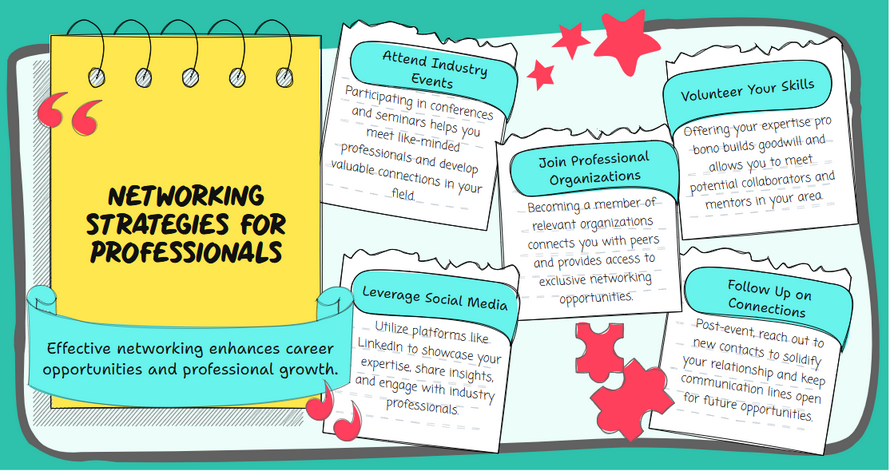Networking Strategies: Networking is a critical component of professional success. It helps individuals build relationships, gain industry insights, and unlock new career opportunities. In today’s competitive job market, having strong professional connections can be just as important as having the right skills and experience. Networking Strategies Effective networking goes beyond simply exchanging business cards—it involves building meaningful relationships, offering value to others, and continuously expanding one’s network. Whether you are an entrepreneur, job seeker, or industry professional, strategic networking can help you achieve career growth and long-term success.
The Importance of Networking in Career Growth

Networking plays a crucial role in career advancement. Many job opportunities are never publicly advertised but are instead filled through referrals and connections. Establishing a strong network can give you access to hidden opportunities, industry knowledge, and mentorship. Networking also enhances credibility and visibility, making it easier for professionals to stay informed about industry trends and changes.
Also Read: Balancing Work and Life: Achieving Harmony in a Busy World
Beyond job opportunities, networking fosters collaboration and knowledge sharing. Professionals who actively engage with peers and industry experts gain fresh perspectives and innovative ideas that can drive career and business growth. Additionally, networking helps build confidence, improve communication skills, and develop a personal brand that enhances professional reputation.
Key Networking Strategies to Expand Professional Connections

Building a strong professional network requires a proactive approach. Here are some key strategies to expand and strengthen your connections effectively:
1. Leverage Online Networking Platforms
Social media and professional networking platforms such as LinkedIn, Twitter, and industry-specific forums are powerful tools for expanding professional connections. LinkedIn, in particular, serves as a virtual networking hub where professionals can connect with industry leaders, join discussions, and showcase expertise. Regularly updating your profile, engaging with content, and joining relevant groups can significantly enhance your online presence.
2. Attend Industry Events and Conferences
Industry events, trade shows, and professional conferences provide excellent opportunities to network with like-minded individuals. Attending these events allows professionals to meet potential employers, collaborators, and mentors. To maximize the benefits, research attendees in advance, prepare an elevator pitch, and actively participate in discussions and networking sessions.
3. Join Professional Associations and Organizations
Becoming a member of professional associations relevant to your industry can open doors to networking opportunities. These organizations often host meetings, webinars, and networking events that connect professionals with peers, mentors, and potential employers. Additionally, being an active member demonstrates commitment to professional development and industry engagement.
4. Engage in Informational Interviews
An informational interview is a great way to learn from experienced professionals while expanding your network. Reaching out to industry experts for career advice or insights not only enhances knowledge but also builds strong relationships. Asking thoughtful questions and showing genuine interest in their experiences fosters meaningful connections that may lead to future opportunities.
5. Develop and Maintain Meaningful Relationships
Networking is not just about making new connections but also about maintaining existing relationships. Following up with new contacts, checking in with former colleagues, and staying engaged with mentors help build lasting professional relationships. Networking Strategies Personalized follow-ups, offering help, and sharing relevant resources strengthen connections and increase the likelihood of reciprocal support.
6. Utilize Alumni Networks
Alumni networks are valuable resources for career growth and networking. Many universities and colleges have dedicated alumni associations that host networking events, mentorship programs, and career development workshops. Networking Strategies in Engaging with fellow alumni can create valuable connections that may lead to job referrals and professional collaborations.
7. Engage in Thought Leadership and Content Sharing
Sharing valuable content and industry insights positions professionals as thought leaders in their field. Writing articles, publishing LinkedIn posts, participating in panel discussions, and contributing to industry blogs demonstrate expertise and attract like-minded professionals. Thought leadership not only enhances credibility but also increases visibility within professional circles.
8. Offer Value to Your Network
Successful networking is built on the principle of reciprocity. Offering value to your network, whether through sharing resources, making introductions, or providing career advice, fosters trust and goodwill. Those who contribute to their professional communities are more likely to receive support and opportunities in return.
9. Expand Your Network Beyond Your Industry
While industry-specific connections are crucial, networking beyond one’s immediate field can open up unexpected opportunities. Networking Strategies Connecting with professionals from diverse industries brings fresh perspectives and potential collaborations that can enhance career growth. Cross-industry networking can also lead to innovative ideas and new business ventures.
10. Be Consistent and Patient
Networking is a long-term investment that requires consistency and patience. Building meaningful connections takes time, and not every interaction will result in an immediate opportunity. Networking Strategies However, Networking Strategies by continuously engaging with peers, staying active in professional communities, and nurturing relationships, professionals can create a strong network that benefits them throughout their careers.
Overcoming Common Networking Challenges
Networking Strategies for Many professionals face challenges when it comes to networking. Here are some common obstacles and ways to overcome them:
- Introversion or Social Anxiety: Many professionals struggle with networking due to shyness or social anxiety. To overcome this, start with small networking events, practice conversations in advance, and gradually build confidence through online interactions before attending in-person events.
- Lack of Time: Busy professionals often find it difficult to prioritize networking. Setting aside a few minutes each week to engage on LinkedIn, schedule coffee meetings, or attend short virtual events can make networking more manageable.
- Fear of Rejection: Reaching out to industry leaders or new contacts can be intimidating. However, most professionals appreciate genuine networking efforts. Approaching networking with a mindset of learning and collaboration rather than immediate gain reduces the fear of rejection.
- Difficulty in Maintaining Connections: Building a network is one thing, but maintaining relationships requires effort. Setting reminders to check in with contacts, sharing relevant content, and expressing appreciation for their contributions can keep professional relationships strong over time.
The Role of Networking in Long-Term Career Success
Effective networking is not just about short-term job searches—it plays a crucial role in long-term career success. Networking Strategies Professionals with strong networks have access to better career opportunities, mentorship, and continuous learning. Networking fosters professional growth by providing exposure to diverse perspectives, industry insights, and collaborative opportunities.
Networking also enhances leadership development. Many successful leaders credit their professional networks for their career advancement. By surrounding themselves with inspiring individuals, professionals can gain valuable mentorship, career advice, and motivation to achieve their goals.
Conclusion
Networking is a powerful tool that can significantly impact career success. By leveraging online platforms, attending industry events, joining professional associations, engaging in informational interviews, and maintaining meaningful relationships, professionals can build a strong network that supports their career growth. Networking Strategies Overcoming networking challenges, offering value to connections, and staying consistent in networking efforts ensure long-term success.
In an Networking Strategies increasingly interconnected world, building and nurturing professional relationships is essential for career advancement. Whether you are looking for a new job, seeking mentorship, or exploring new business opportunities, a well-established network can be a valuable asset in achieving your professional goals. Start networking today and unlock new opportunities for growth and success.


Pingback: The Evolution of Digital Payments: How Fintech is Changing Transactions - Pivot Yourself
Pingback: Building Resilience -
Pingback: Powerful Motivational Speaker: Ignite Your Spectacular Life - Pivot Yourself